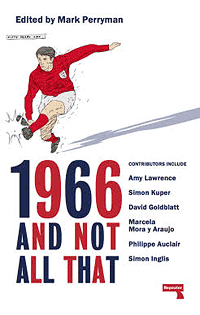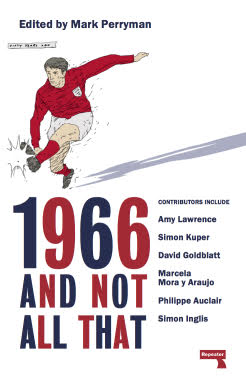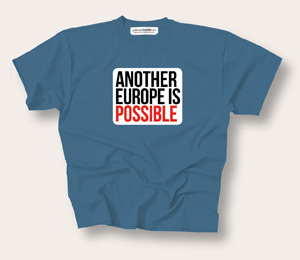
TISDALE & MURRELL Selected Prints, 9-30 April 2016, Swan House Gallery, Harwich
20.04.16
Sanjiv Sachdev reviews an exhibitiion of prints by Philosophy Football designer Hugh Tisdale and Illustrator Dan Murrell
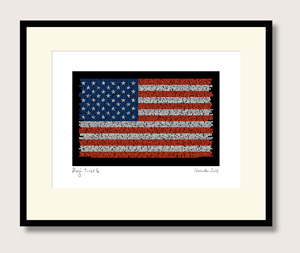 In ‘Waiting for the Great Leap Forward’ Billy Bragg famously sings that “The revolution is just a T-shirt away”. The phrase now, of course, adorns a Bragg-approved Philosophy Football T-shirt, and captures the subject matter of Hugh Tisdale and Dan Murrell’s exhibition of prints; an interest in music, progressive politics and pop culture in its broadest sense. A small slice of a huge, wide-ranging catalogue is present here, starting in 2000 and ending in 2016, of 20 prints produced in silkscreen, digital and hand-stencilled media.
In ‘Waiting for the Great Leap Forward’ Billy Bragg famously sings that “The revolution is just a T-shirt away”. The phrase now, of course, adorns a Bragg-approved Philosophy Football T-shirt, and captures the subject matter of Hugh Tisdale and Dan Murrell’s exhibition of prints; an interest in music, progressive politics and pop culture in its broadest sense. A small slice of a huge, wide-ranging catalogue is present here, starting in 2000 and ending in 2016, of 20 prints produced in silkscreen, digital and hand-stencilled media.
The T-shirts of Philosophy Football led where many have since followed: sleek, stylish, punchy design married to political and social comment with a sparkle of wit. They use a democratic format of which William Morris would have approved - being both beautiful and useful - but one which is also, unlike that of Morris, affordable. At around £20 each they are within the budgets of most. Well made and well-designed, with double stitching and using heavy cotton, they are not flimsy products, but are built to last. Some designs commemorate and celebrate, others mock and indict. Most but not all of these prints were originally T-shirt designs.
Like a Banksy graffiti, a T-shirt or a magazine cover needs to make an immediate, instant impact to attract attention. They also need visual wit and panache to earn a second, longer look. Most of these prints reflect these aims – they are often visceral and kinetic, with a guitar about to be smashed to pieces or a badger brandishing a smoking gun, Daleks with guns blazing and in demented war-cry, a fighter-plane in full flow or a Mickey Mouse with the menacing grin of a blood-hungry Dracula or the surging, game winning run of a rugby player. Others are idea-led; thus the American Dream and Martin Luther King’s Dream fuse to give a whole new resonance to the stars and stripes; a barcode and the words ‘don’t think, consume’, seemingly redolent of Klein’s ‘No Logo’ arguments, indict empty consumption; the Clash’s scornful rejection of vacuous celebrity worship is caught in DIY punk style, pallette, and typewriter font. Hugh Tisdale says ‘simplicity is my favourite word’ and these pictures are, deceptively, simple with their straight, clear, clean, uncluttered lines.
On closer inspection much thought and care are evident. Influences of art, photography and pop culture abound, be it British, with Constable’s Haywain, via Peter Kennard, and in the wrecked car there are echoes of the car husk from the First Iraq War, now in the Imperial War Museum, the 1940 ‘Few’, Peter Cook, Tommy Cooper, Dr Who, hints of James Bond, the Jam, the Clash, Red Wedge; the US with Laurel and Hardy, Mickey Mouse, Warhol/Coca Cola, Lichtenstein, Martin Luther King, and Jasper Johns; Russian Constructivists, especially El Lissitzky, or Castro in the manner of poster-boy Che. Flags, for the US (which the art critic Robert Hughes claimed to be ‘the most recognised abstraction in the world’) and Palestine, are imbued with the spirit of protest with words using Tisdale’s favoured sans-serif ‘Shire’ fonts.
The printing process often entails the use of a few carefully-chosen colours – three of the pictures use just black and shades of white, another adds a small, eye-catching, daub of poppy-red. Most use three or four. Reproducability is key. A spotlight-like circle is often used to frame a figure – be it a Gatling Gun-totting badger, a Bond-imitating, snarling Malcolm Tucker (whose belligerent pointing finger has the lethal presence of a Walther PPK) or a speeding Hawker Hurricane, where the circle deftly doubles as a propeller in motion – my particular favourite – capturing movement with stillness, using so little.
Given the long and continuing association of football with the work of Tisdale and Murrell, it is a slight surprise that, aside from a World War I football, none representing the beautiful game are in the show. Sport’s sole contribution is a powerful picture of All-Black Jonah Lomu, framed by an exquisite, circular Maori symbol.
The show deserves a wider audience. It reflects and has partly shaped an aesthetic of comment and protest. I hope this is the first of many.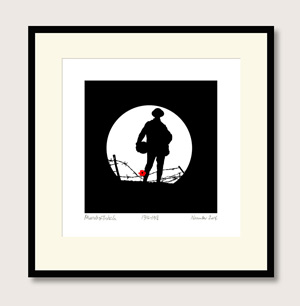 ‘Tisdale & Murrell’ is at the Swan House Gallery, 14 Kings Head Street, Harwich CO12 3EE. Open Tues-Sat 10.00am-5.00pm, Sun 10.00am-4.00pm until 3rd May
‘Tisdale & Murrell’ is at the Swan House Gallery, 14 Kings Head Street, Harwich CO12 3EE. Open Tues-Sat 10.00am-5.00pm, Sun 10.00am-4.00pm until 3rd May
Philosophy Football limited editiion prints by Tisdale & Murrell are available for purchase from here
Where have all the flowers gone?
08.04.16
Mark Perryman of Philosophy Football reviews the new wave of rebel music
It has become almost a mantra, there’s no protest music any more, discuss. In the mainstream maybe, though Beyoncé for one by following up her embrace of feminism with the message that the Black Panthers matter seems to confound even that. The trouble for musos of a certain age is that the rebel rock of yesteryear, from Guthrie to the Clash, existed in a popular culture almost entirely different to the one any musical rebellion of today has to navigate its way round. So how to make the connections to the past whilst remaining meaningful , not to mention musical, in 2016?
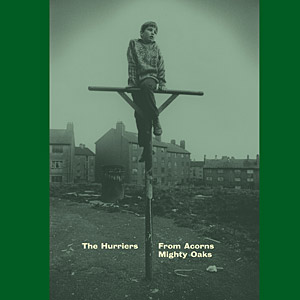 Take The Hurriers who seem to be single-handedly turning their home town Barnsely into a citadel of soulful socialism. Absolutely shaped by the enduring legacy of the miners’ strike this is band whose sound is straight out of the mid-eighties Redskins songbook , that’s a compliment not a criticism incidentally. Debut album From Little Acorns Mighty Oaks absolutely confirms this, music to shout along to rather than sing along to, full of commitment mixed up with rousing tunes. Or Thee Faction, kind of the southern cousins of the aforementioned, though my all-time favourite description of them remains ‘Comrade Feelgood’. Whereas The Hurriers remind older listeners of The Redskins this lot have Wilko written all over them, again a compliment not a critique. Their latest masterpiece Reading, Writing, Revolutioncontinues where previous albums left off combining music to dance to with a richly acute ear for socialist history. Dialectics for the dancefloor, just what The Corbyn Effect demands.
Take The Hurriers who seem to be single-handedly turning their home town Barnsely into a citadel of soulful socialism. Absolutely shaped by the enduring legacy of the miners’ strike this is band whose sound is straight out of the mid-eighties Redskins songbook , that’s a compliment not a criticism incidentally. Debut album From Little Acorns Mighty Oaks absolutely confirms this, music to shout along to rather than sing along to, full of commitment mixed up with rousing tunes. Or Thee Faction, kind of the southern cousins of the aforementioned, though my all-time favourite description of them remains ‘Comrade Feelgood’. Whereas The Hurriers remind older listeners of The Redskins this lot have Wilko written all over them, again a compliment not a critique. Their latest masterpiece Reading, Writing, Revolutioncontinues where previous albums left off combining music to dance to with a richly acute ear for socialist history. Dialectics for the dancefloor, just what The Corbyn Effect demands.
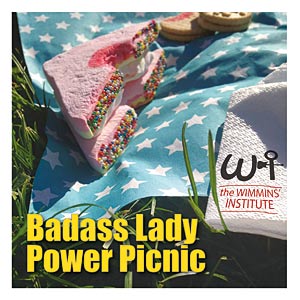 Reminding me of early Belle and Sebastian vocals-wise the debut album from The Wimmins Institute comes with a title nobody is going to forget in a hurry Badass Lady Power Picnic. The combination of wit and a lightness of music touch seves to prove showing our anger doesn’t always mean playing angry music, nice. The rising prominence of women musicians in protest music is splendidly reported in a new, and free e-zine, with the brilliant title Loud Women. Promoters of political gigs have a read, there is absolutely no excuse for not having 50:50 in your line-ups.
Reminding me of early Belle and Sebastian vocals-wise the debut album from The Wimmins Institute comes with a title nobody is going to forget in a hurry Badass Lady Power Picnic. The combination of wit and a lightness of music touch seves to prove showing our anger doesn’t always mean playing angry music, nice. The rising prominence of women musicians in protest music is splendidly reported in a new, and free e-zine, with the brilliant title Loud Women. Promoters of political gigs have a read, there is absolutely no excuse for not having 50:50 in your line-ups.
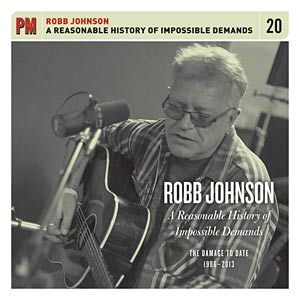 A key role of protest music through the ages from has always been to provide a chronicle of the times we live, the histories from where we carve the present out of and futures we might dream about. Leon Rosselson is without much doubt the most important singer of this tradition in Britain. His new album Where are the Barricades? marks his retirement at the age of 81 after some six decades of songwriting and singing. Full of anger, wit and imagination that Leon has always provided across over all those years. Robb Johnson comes from a slightly later era to Leon, though his beautifully packaged 5-CD box set A Reasonable History of Impossible Demands still manages to account for almost three decades of protest singing, 1986-2013. This is the era of Thatcher, the miners, Hillsborough, Stop the War and a whole lot more, the news via song and guitar. Yes it sounds old-fashioned but as a means to provide a collective response to all that is thrown our way, a sense of identity and belonging, and knowledge too Robb and Leon’s trade in verse and tunes has few rivals. Joe Solo is one of many now adding something new to this tradition. A musician-activist Joe’s new CD Never Be Defeated is what might once have been called by other artists a ‘concept album’. The difference lies in the kind of concepts Joe is interested in. Solidarity, community and resistance in the coalfields of South Yorkshire ’84-85.
A key role of protest music through the ages from has always been to provide a chronicle of the times we live, the histories from where we carve the present out of and futures we might dream about. Leon Rosselson is without much doubt the most important singer of this tradition in Britain. His new album Where are the Barricades? marks his retirement at the age of 81 after some six decades of songwriting and singing. Full of anger, wit and imagination that Leon has always provided across over all those years. Robb Johnson comes from a slightly later era to Leon, though his beautifully packaged 5-CD box set A Reasonable History of Impossible Demands still manages to account for almost three decades of protest singing, 1986-2013. This is the era of Thatcher, the miners, Hillsborough, Stop the War and a whole lot more, the news via song and guitar. Yes it sounds old-fashioned but as a means to provide a collective response to all that is thrown our way, a sense of identity and belonging, and knowledge too Robb and Leon’s trade in verse and tunes has few rivals. Joe Solo is one of many now adding something new to this tradition. A musician-activist Joe’s new CD Never Be Defeated is what might once have been called by other artists a ‘concept album’. The difference lies in the kind of concepts Joe is interested in. Solidarity, community and resistance in the coalfields of South Yorkshire ’84-85.
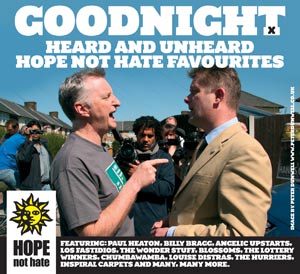 Out of the despair of the Tories 2015 General Election victory and the delight of Jeremy Corbyn’s entirely unexpected landslide win in the Labour Leadership vote a wave of protest music , old and new, erupted. Goodnight Heard and Unheard Hope not Hate Favourites is a double CD compilation of anti-fascist tunes, some of the classic variety – Billy Bragg’s The Battle of Barking – but for the most part pleasantly unpredictable, both artist and content. Plenty of old favourites too, Inspiral Carpets, Attila the Stockbroker, Wonder Stuff and Chumbawamba,, alongside the latest of the new wave including Siobhan Mazzei, Blossoms, Tracey Curtis, Steve White and the Protest Family. A rich variety yet still journos ask ‘ Whatever happened to political music?’ Doh.
Out of the despair of the Tories 2015 General Election victory and the delight of Jeremy Corbyn’s entirely unexpected landslide win in the Labour Leadership vote a wave of protest music , old and new, erupted. Goodnight Heard and Unheard Hope not Hate Favourites is a double CD compilation of anti-fascist tunes, some of the classic variety – Billy Bragg’s The Battle of Barking – but for the most part pleasantly unpredictable, both artist and content. Plenty of old favourites too, Inspiral Carpets, Attila the Stockbroker, Wonder Stuff and Chumbawamba,, alongside the latest of the new wave including Siobhan Mazzei, Blossoms, Tracey Curtis, Steve White and the Protest Family. A rich variety yet still journos ask ‘ Whatever happened to political music?’ Doh.
Orgreave Justice is another double CD also featuring Billy Bragg alongside Louise Distras, Sleaford Mods, Paul Heaton with less well-known names Quiet Loner, The Black Lamps, Matt Abbott and more. The common theme here is truth and justice framed by that epic moment in the 84-85 Miners’ Strike, Orgreave. The specificity of the theme gives the disparate tunes and voices a collective sense of purpose producing an album of record as well as resistance. The spoken word and folk interludes sit well alongside the more obviously rousing tracks to create a really impressive compilation, in fact a textbook version for others to follow.
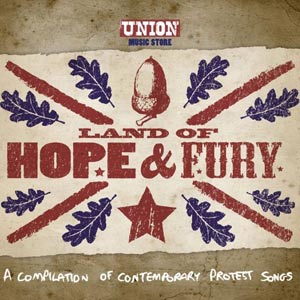 Based in my hometown Lewes, East Sussex Union Music Store is an extraordinary factory of good music – live music, record shop, recording studio and their own record label too. Every town should have one, sadly most don’t. Testament to their ambition and impact is the CD they rush-released within a few weeks of the nightmare Tory victory (on just 24% of the popular vote it should always be remembered) last May. Land of Hope and Fury also benefits from the specificity of its content, this time in terms of musical styles, mainly of Americana, Country and Folk which is what Union unashamedly favour. Lucy Ward, Mark Chadwick of the Levellers, Moulettes, O’Hooley and Tidow, with for me Grace Petrie’s If There’s A Fire in your Heart providing the absolute stand out track of a very splendid lot.
Based in my hometown Lewes, East Sussex Union Music Store is an extraordinary factory of good music – live music, record shop, recording studio and their own record label too. Every town should have one, sadly most don’t. Testament to their ambition and impact is the CD they rush-released within a few weeks of the nightmare Tory victory (on just 24% of the popular vote it should always be remembered) last May. Land of Hope and Fury also benefits from the specificity of its content, this time in terms of musical styles, mainly of Americana, Country and Folk which is what Union unashamedly favour. Lucy Ward, Mark Chadwick of the Levellers, Moulettes, O’Hooley and Tidow, with for me Grace Petrie’s If There’s A Fire in your Heart providing the absolute stand out track of a very splendid lot.
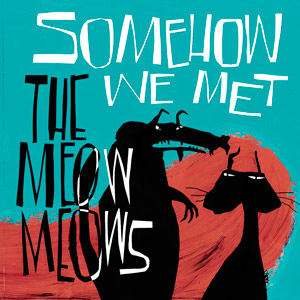 A music of change needs a music we can dance to as well. A mix of conscious lyrics and rhythms to move body and soul. It’s no accident that the 1980s Two-tone music was one of the first to provide this mix and with an unrivalled multicultural line-up too. A ska revival has been a long time coming but there is a hint of it with Captain SKA and South Coast favourites The Meow Meows. Both are absolute showstoppers live. The Meow Meows are promising to release a third album soonish, meantime treat yourself to some uneasy listening off their second album Somehow We Met.
A music of change needs a music we can dance to as well. A mix of conscious lyrics and rhythms to move body and soul. It’s no accident that the 1980s Two-tone music was one of the first to provide this mix and with an unrivalled multicultural line-up too. A ska revival has been a long time coming but there is a hint of it with Captain SKA and South Coast favourites The Meow Meows. Both are absolute showstoppers live. The Meow Meows are promising to release a third album soonish, meantime treat yourself to some uneasy listening off their second album Somehow We Met.
A rebel music that knows its history, diverse in styles, mashing up gender, race and sexuality, conscious lyricism with enough tunes for those out to look good on the dancefloor. Not the same as it’s ever been, but paying dues to those who went before. Sam Cooke’s A Change is Gonna Come . Not just a classic tune, but a shared musical and political ambition too, now and back then too.
Mark Perryman is the co-founder of Philosophy Football. On Saturday 1st October at Rich Mix London 2016 Philosophy Football in association with the RMT and Thompsons Solicitors, supported by The International Brigade Memorial Trust will be marking the 80th Anniversary of Cable Street and the formation of the International Brigades with a night showcasing protest music 2016 introduced byMark Thomas and featuringThe Hurriers, Louise Distras, The Wakes, Potent Whisper, Will Kaufman and Lánre. Ticket details to follow but reserve the date for a night not to be missed.
In a stink about a pink St George Cross
02.04.16
Professional controversialist Toby Young has got himself all upset about a pink St George Cross at England vs Netherlands
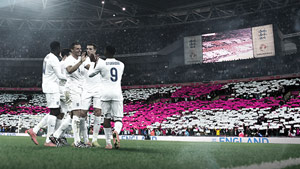 Oh dear. Toby Young is all in a lather, a victim once more of the ‘PC brigade’.
Oh dear. Toby Young is all in a lather, a victim once more of the ‘PC brigade’.
Writing in the Daily Mail,he describes the scene he seems to have witnessed at Tuesday night’s England international versus the Netherlands. “It was fitting that Tuesday's England match was awash with pink shirts, pink ribbons and pink flags. After all, football — along with rugby, cricket and every other traditionally male sport — has been forced to undergo what you might call, to borrow a fashionable phrase, gender re-assignment surgery in the past few years. An area of life that used to be associated with men has been colonised by women determined to prove a point about gender equality, regardless of whether they have any genuine interest in the sports in question.”
Oh dear, the thinking-bloke’s Jeremy Clarkson really has his boxer shorts in a twist hasn’t he? I have a confession to make to Toby. I’d spent most of Tuesday afternoon laying out thousands of cards across the England home end in the stadium. It’s a fan-led initiative called ‘Raise the Flag’, and when God Save the Queenstrikes up they’re held up to form a huge St George Cross flag, mosaic-style. Except this time, when the anthem came to an end, the red cross was flipped to form a pink one, honouring the victims and survivors of this most deadly of diseases, breast cancer. I’m not sure where Toby was sitting in the stands but where I was there wasn’t one murmur of discontent but, rather, a ‘wow moment’ and widespread approval. Then the game kicked off; what Toby fails entirely to mention was what happened at the 14th minute, the entire crowd – English and Dutch – standing to honour the memory of Johan Cruyff. The cancer that killed Johan attacked his lungs, not his breasts, same disease, different body parts.
Toby sees political correctness almost everywhere, a phantom stalking this most illiberal of lands. Now, in his view, its got a grip on sport, or more particularly, Toby’s very particular version of a masculinity epitomised by football . When I lay out a St George Cross before each and every England game, be it red, pink or any other colour under the rainbow I don’t see a symbol of nationalism or politics, correct or otherwise. Rather I see a flag made up of thousands of individual fans holding up a huge vision of human solidarity. A fans’ flag, it belongs to all of us, not Toby, not me, all of us. I’m not sure if Toby was at Wembley last November, I certainly don’t remember him writing about the huge flag we held up that night. Not St George, but the French Tricolour, solidarity once more, this time with the victims of the terror attack on Paris , including the Stade de France, a few days earlier. Was that ‘political correctness gone mad’ Toby? Or was it simply a symbol of borders not meaning very much when as fans we are all united against the bloody terrorism of ISIS and their off-shoots?
HIs main point seems to be what has breast cancer got to do with football? A game increasingly played by women, and one in which the England women’s team beat Germany a year ago not in a meaningless friendly but in a World Cup, seems to have gone unnoticed by Toby. Nor does he seem much bothered that many of us blokes will have mums, grannies, aunties, sisters, nieces, girlfriends, daughters, neighbours, friends and workmates who suffer from this most gendered of diseases. It’s called caring about others, Toby. Isn’t that something we should all stand, cheer, have some pride in, whatever our team?
Football is never going to change the world. That’s not its place, an England team that can stick it out at the Euros to the quarters or beyond is about as much as most of us can hope for. But that doesn’t mean it isn’t a space, on the pitch and in the stands, where ideas aren’t offered and contested. Toby would prefer a world of football unchanged from that golden 1966 summer 50 years ago, where men were men and women knew their place. I prefer instead a football that at least tries to keep up with, if not always change with, the times. An England for all, whatever our colour, faith or none, whatever the country we or our parents originally came from. This – the single biggest change in what an England team looks like, is supported by Tuesday night’s team on the pitch: once more – Sturridge, Alli, Rose, Smalling, Clyne and more. Gender diversity on the pitch is is perhaps a bit further off. But male fans standing up to show they care about breast cancer – that’s the kind of England crowd I want to be part of, thank you very much, even if Toby doesn’t.
Mark Perryman is the co-founder ofPhilosophy Football and author of the new book 1966 And Not All That to be published by Repeater Books in mid-May.
They Took the words right out of our mouths
18.03.16
Mark Perryman of Philosophy Football applauds Dortmund fans’ vision of another Europe
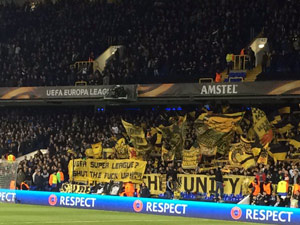 When the Borussia Dortmund fans held up their brilliant banner at White Hart Lane on Thursday night ‘UEFA Super League? Shut the Fuck Up’ for many fans in England too the response would be ‘you took the words right out of our mouth’. Theirs’ is a vision of another Europe which they passionately believe is possible. A passion barely present in the establisghment in/out Europe campaigns miured in their competing versions of status quo politics.
When the Borussia Dortmund fans held up their brilliant banner at White Hart Lane on Thursday night ‘UEFA Super League? Shut the Fuck Up’ for many fans in England too the response would be ‘you took the words right out of our mouth’. Theirs’ is a vision of another Europe which they passionately believe is possible. A passion barely present in the establisghment in/out Europe campaigns miured in their competing versions of status quo politics.
Good Europe or bad Europe? Instead of taking boring old Westminster or Brussels bubble politics as a starting point how about football? The old European Cup was the best cup competition in the world, sorry FA Cup sponsored by wotsit, bar none. A simple idea made good, only the league champion of each European nation in an unseeded knockout competition. Home and away legs gave the bigger clubs some advantage but built into the campaign those European glory nights for stay-at-home and travelling fans alike. What was there possibly not to like?
Well the football authorities and rival continental club sides didn’t like the near total domination by English club sides in the mid 1970s to mid 1980s . For an incredible run of 8 years 1976-84 Liverpool (4 times) Nottingham Forest (twice), Aston Villa won the trophy.The only break in the sequence being Hamburg in ’83, and the player at the core of their trophy-winning side? One Kevin Keegan.
The ’85 Heysel Final outrage involving fighting Liverpool, Juve fans and a decrepit stadium resulted in an ensuing indefinite ban on English club sides entering European competition. Following the lifting of the ban after Italia ’90 the English dominance has never been the same again.
Of course shifts in dominance in team sports are natural and to be welcomed, Real Madrid in the 1950s, Ajax in the early 1970s were two other periods dominated by a single club let alone one country. What is entirely unnatural in sport is to seek to reduce the risk of competitive unpredictability by fixing the format. This is precisely what happened in ’92 when the European Cup became the Champions and Rich Runners-Up League. The combination of a group stage and seeding almost overnight eliminated the risk of so-called ‘big’ clubs going out early, a giant-killing which provides the magic of cup competitions was got rid off in favour of risk-aversion.
And to make matters still worse for exactly the same reasons, reducing competiveness in favour of maximising profit, in 2004 the knockout UEFA Cup was replaced also by a group stage competition to become The Europa League for no obviously good reason. Perhaps worst of all previously in 1999 the perfectly good Cup-Winners Cup was simply abolished.
Choice and modernisation are the ready-made watchwords of contemporary politics. They are weasel words, devoid of any meaning. In European football they have come to mean the rich clubs getting richer at the expense of competition. A European Superleague according to well-founded rumours remains a serious proposition. Those rich runner-ups who can’t even make third or fourth in their domestic league but because they top the brand value and disposable income will be guaranteed entry as of inalienable right.
It was fit and proper that the banner of resistance was raised at White Hart Lane. Spurs are a club who won the league and cup double in ’61 and went on to become the first English club to win a European trophy, the Cup-Winners Cup in ’63. Despite all that the club described finishing 4th in the league 2009-10 and thus qualify for the Champions League as the club’s ‘greatest ever achievement’. Fourth? Fourth! How does the song go? ‘If you know your history…’
The lesson of history of course should be that as with all things tubo-capitalist be careful what you wish for. Steeled in cup competitions that in those days actually meant something those British club sides that grabbed one European trophy after another in the 1970s and 80’s were superbly well-equipped for the knockout format. Pre the ’85 ban the 19080s looked like this UEFA Cup won in 1980-81 by Ipswich Town, 83-84 by Spurs. The Cup Winners Cup, won 82-832 by Aberdeen, 84-85 Everton. Compare to this since 1990 just the two Europa League wins, Liverpool in 2001 and Chelsea 2013.
Celtic’s Lisbon Lions triumph in ’67 to lift the European Cup followed the next year by Man United winning the same competition was more of a one off. But nevertheless had a cultural currency that a Champions League victory, and most definitely a Europa League victory, seems to lack. Capital never learns, money, thankfully, isn’t everything.
The big squeeze of on the one hand a laborious group stage and on the other an over-arching importance domestically to secure a Champions League place has reduced British dominance. And at the same time regardless of the huge wages on offer in the ‘best league in the world’ (sic) Europe’s best players are by and large playing elsewhere. Messi, Neymar, Suarez, Ronaldo and Bale in Spain. Pogba in Italy. Lewandowski, Hummel, Müller in Germany, Ibrahimovic in France. And plenty more of that kind of quality that lot came from few in the better-paid Premier League can match. Once more, money isn’t everything.
The Dortmund fans know their football, they know what it means to be fans not consumers. A club that hasn’t sold its soul along with lock, stock and barrel to the highest bidder. They have one of the biggest standing terraces in European football, where they can drink too.
What’s all this got to do with the Euro referendum? Plenty. If in, out or shake it all about is to mean anything it means the so-called island race understanding that Europe is where as nation state(s) we came from . To engage with and embrace the continental as so many of us do in every sphere of life, including football, bar the body politic. Not to smudge the differences but to appreciate the commonalities and hold on to only those differences that truly matter.
‘UEFA Super League Shut The Fuck Up’ that will do nicely. Testament to a popular internationalism. For the fainthearted perhaps the Dortmund fans should mind their language but make no mistake not a single word, or sentiment, was lost in translation. Danke!
Mark Perryman is the co-founder of Philosophy Football his new book 1966 and Not All That is published in mid-May.
Ireland Always Rising
14.03.16
For St Patrick’s Day Mark Perryman outlines the meaning of the forthcoming Easter Rising Centenary for models of Britishness
 St Patrick’s Day. Down the local, one of the best night outs of the year, a non-stop party drenched in all things Irish. A celebration of Ireland’s freedom, which can never be entirely separated from history either.
St Patrick’s Day. Down the local, one of the best night outs of the year, a non-stop party drenched in all things Irish. A celebration of Ireland’s freedom, which can never be entirely separated from history either.
For decades it was Ireland that defined first the British Right, the Conservative and Unionist party remember, and then latterly the street-fighting Far Right too with their links loyalist paramilitaries and hatred of all things otherwise from Ireland. Today such connections are broken, the last remnants the unofficial insertion of ‘No Surrender’ into the National Anthem (sic) by a section of the football crowd at England internationals. No surrender? To what exactly.
But the framing of Britishness via its relationship to Ireland has to be accounted for by a range of factors beyond the narrowly political. St Patrick’s Day is emblematic of the complexity and contradictions. Britishness is far more accommodating and porous than it is often credited for. Beyond the body politic take music, popular literature, film and sport where a particular version of Irishness has been embraced. From punk icons Stiff Little Fingers to the Pogues, Sinead O’Connor and The Corrs via Hothouse Flowers and Sawdoctors to the mega-success of U2 this is a cultural insurgency that cannot be lightly discounted. Not so long ago North London’s Finsbury Park would be packed out for the two-day Fleadh festival with an extraordinary range of artists parading their Irish heritage. Glasgow’s Celtic Connections celebration today does something similar.
Roddy Doyle, particularly with his Barrytown trilogy of novels transformed for a generation what Irish identity might look like. Full of humour yet never losing sight of where they’d come from and what Ireland had been though to get there. In his recent work a more obviously political author Doyle has never though once lost his popular edge.
This summer, in the year of the 1916 Easter Rising Centenary, Northern Ireland and the Republic will both compete, together and independently of one another, in a major football tournament for the first time. At Euro 2016 there will be two ‘Green and White Armies.’ There’s some history here, not apart from the politics but affected by it, and shaping the political in return too. Northern Ireland made it to World Cup ’82 in Spain, with Martin O’Neill a star of the team who now manages the Republic. They were there in Mexico four years later too for World Cup’86. Then the Republic kind of took over, Euro ’88, Italia 90, World Cup ’94 , managed by Englishman Jack Charlton, one of the heroes of the England ’66 World Cup-winning team. Big Jack built an Irish team around finding players in the English and Scottish leagues who qualified for Ireland via parentage but previously had never thought of playing for the Republic. But notwithstanding the bending of who can and can’t ‘represent’ Ireland something more important was perhaps underway. As the troubles in Northern Ireland edged their way towards an unfolding peace process on the pitch and in the stands what it meant to be Irish and what Ireland might become was being transformed.
But there remain those who would prefer to rewrite their own history. Jeremy Corbyn and John McDonnell were on Labour’s back benches when the IRA’s military campaign was in full and lethal swing. They were amongst the few who at the time argued that what was needed was a political solution and this must include both a dialogue with those behind the bombing and the ending of injustices dished out.They were demonised as ‘terrorist sympathisers’ then. A Tory Party that seems to have forgotten John Major’s role in initiating the peace process is clearly gearing up to use those self-same smears now against a Labour Leader and his Shadow Chancellor some thirty years later.
In Irish politics meanwhile we have seen the emergence of the civic nationalism of Sinn Fein, first mostly in the North but increasingly in the South too, of course it goes without saying that Sinn Fein like all those committed to a United Ireland recognise no such border. An anti-austerity party that sits in the European Parliament with the European United Left alongside socialist and communist parties is a very different proposition to what might have been imagined was possible at the height of the Provos campaign in the 1980s. And in the 2016 Irish General Election alongside the election of Sinn Fein TDs anti-austerity TDs were also elected, while the Irish Labour Party continued its woeful decline, or Pasokification. Sinn Fein and the Anti-Austerity Alliance/People Before Profit alliance are not the same but what they do have in common is a militancy they claim as a shared inheritance from Easter 1916.
A centenary is an excuse, of course, for looking back and that search for meaning is always contested, or at least it should be. We should be able to account for the cultural shifts in how Irish national identity is shaped, the politics of Sinn Fein and others’ civic nationalism understood while the factors that created the conditions for a political solution in place of a military strategy perhaps in these troubled times demand the most careful revisiting of all.
This year’s St Patrick’s Day for many will be the prelude to the Easter Rising Centenary celebrations just a week and a bit later. The connections between the popular culture of a night out and a political legacy will never have been more obvious. Dublin today is a serious competitor to Barcelona and Prague as amongst budget airline travellers’ favourite European destinations for a city break, another instance of the connections between the cultural and the political. Many will visit O’Connell Street to take a snap of the iconic Dublin General Post Office. But of course this isn’t simply a splendid example of late Georgian architecture nor merely a handy place to post a postcard home. It was the HQ in 1916 for the men and women who fought in the Easter Rising. This is a rebel city, a rebel culture, a rebel country that was to break the Union. Ahead of the rising across the front of Dublin’s Liberty Hall, home of the Irish Transport and General Workers Union, a banner was hung ‘We serve neither King nor Kaiser but Ireland.’ This was the nature of that break, the cause of self-determination and independence. Yet as Fintan O’Toole has pointed out some quarter of a million Irishmen fought in the First World war on the British side and during the course of the Rising 570 Irish soldiers lost their lives on the Western Front following a particularly lethal German gas attack. So that breakage is complicated, it was partial and while some defined their nationalism as ‘my enemy’s enemy is my friend’ whatever their motives and intentions, others didn’t. And Irish Nationalism had its internationalist side too, the Irish volunteers who fought with the International Brigades in the Spanish Civil War famously called themselves The Connolly Column, their Irishness fusing with the cause of land and freedom. While others defined the cause of Ireland in terms of the purity of a particular version of Catholicism to side with Franco against the Spanish republic.
Today a faith-based politics is of decreasing importance in the modern Ireland as evidenced by the referendum vote in favour of equality in marriage for Lesbians and Gay men. It was James Connolly’s vision that ‘the Irish people will not be free until they own everything from the plough to the stars.’ It is this vision that more than anything should frame how we celebrate Easter 1916. As a very Irish moment when the human potential of freedom and equality was most evident and could never be extinguished whatever the scale and might of the forces ranged against it. To that all of us, Irish or not, should gladly raise a glass on Thursday night. Happy St Patrick’s Day!
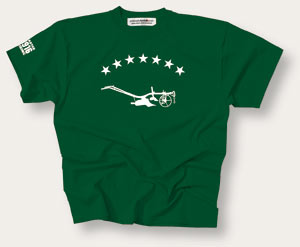 Philosophy Football’s Easter 1916 T-shirt range, 20% off until St Patrick’s Day quote coupon code Easter 2016 at checkout. The T- shirts are available from here
Philosophy Football’s Easter 1916 T-shirt range, 20% off until St Patrick’s Day quote coupon code Easter 2016 at checkout. The T- shirts are available from here
What is the point of the European Union?
01.03.2016
Sanjiv Sachdev of Philosophy Football reports on the launch ofGood Europe initiative
 Cold, winter Sunday evenings are not the most auspicious times to hold political seminars, yet this one was had a packed (and sleekly designed, Emirates funded) lecture hall of 400 people, with many more on the waiting list. In part, this was due to a panel featuring Yanis Varoufakis, the flamboyant and charismatic former Syriza finance minister of Greece– with the Guardian columnist, Zoe Williams and the Green Party MP Caroline Lucas.
Cold, winter Sunday evenings are not the most auspicious times to hold political seminars, yet this one was had a packed (and sleekly designed, Emirates funded) lecture hall of 400 people, with many more on the waiting list. In part, this was due to a panel featuring Yanis Varoufakis, the flamboyant and charismatic former Syriza finance minister of Greece– with the Guardian columnist, Zoe Williams and the Green Party MP Caroline Lucas.
The event was organised by the think tank Compass. The chair of Compass, Neal Lawson, opened the event with an eloquent summary of the ‘Brexit’ stakes – much higher than petty personal political ambitions of Boris Johnson and the spurious last minute deals of Cameron. Beyond the urgent need for European cooperation to tackle climate change, the spectre of global financial meltdown and pressing issues of migration and xenophobia, Neal contended that the referendum, like the Scottish one before it, offered an opportunity to re-imagine the kind of Europe we want. To this end Compass is seeking to build a network of activists, campaigners and politicians against Brexit and for a ‘Good Europe’ on June 23rd.
Caroline Lucas, who has an ability to articulate complex, sometimes dry, issues in a clear, vivid style, urged the widening of horizons – to examine what kind of people we are and what we want for our children, denouncing the narrow, dismal, dreary transactional view of the EU proposed by Cameron and instead arguing for an EU with sustainability and social justice at its heart. The latter could be the EU’s new ‘big idea’, as the former binding ideas of peace on the continent lose their potency and appeal. This would include an EU that was a global leader on renewable energy, that tackled wealth inequalities and fuel poverty – closing the gap between rich and poor (she noted that the Structural funds, if used imaginatively, provide the basis of such a redistributive mechanism). Caroline was well aware of the EU’s flaws but also recognised its positive potential – thus while corporations do wield far too much influence, the EU also led the world in the Paris climate change talks. She noted that the much criticised TTIP, would not be any better in a Cameron-led government bilateral negotiation – many of its more pernicious provisions were ones that his government either instigated or supported – leaving the EU would not improve trade policy. However, the need for greater accountability and transparency continued to be pressing. The EU needs reform but the main challenges we face today – from climate change, refugees, financial regulation and terrorism – continue to be cross border ones.
Zoe Williams also sought to shift our focus to what Europe could be rather than what it looks like now. She wanted us to imagine what a ‘good Europe’ would look like (citing Adorno’s maxim that we should discover not the past, but the dreams of the past) – seeing nascent signs of hope in the growing bonds between refugee charities and green groups. Zoe contended that the ‘Leave’ campaign had alienated broader discussion by its arcane focus on tedious intricacies and toxic untruths. She noted that ‘big dreams’ underpinned the EU – that of trade bonds displacing those of war. Moreover, the benign impact of the EU on matters like the environment and workers rights are tangible gains that need to recognised and celebrated – they would not have come from a UK government. The EU Commission’s proposals for refugees were far more humane than that of national governments, especially governments like that of Britain’s.
Academic Mary Kaldor warned of the return of fascism and war if the EU did disintegrate. Moreover, the EU role and capacity of taming globalisation in a globalised world will be neglected in the Brexit debate. Cross national entities are needed to deal with cross border problems – otherwise you have an unfettered globalised world.
Yanis Varoufakis entered the debate with a combative flourish. He contended that the EU was in an advanced state of disintegration – developing into a post-modern version of the 1930s, with borders being resurrected and the Euro fragmenting the EU economy. He drew parallels between the debt-fuelled crash of 1929 and its 2008 successor and the ‘clueless’ responses to both by European governments, as well as the past and current rise of the Far Right – strikingly evident now in Hungry, Poland, Greece and France but elsewhere in Europe too. Yanis called for an alliance of the Left, Liberals and Greens to fight this rising rightward tide – what the 1930s generation failed to do. The Democracy in Europe Movement 2025 (DiEM 25) launched earlier this month by Yanis seeks to reinvigorate the idea of Europe as a union of people ruled by democratic consent rather than by technocratic edict. This would seek to meet the challenges of the refugee crisis, climate change, the dearth of investment on a European basis, not a national one – the ‘cocoon’ of the nation state would be insufficient. But DiEM also sought to answer a question posed by the Right on the issue of sovereignty and legitimacy with greater democracy – the former model of economic integration leading to political union was no longer sufficient to this end.
In the subsequent discussion Caroline said that the Left should not be defensive in the Brexit debate; it was intriguing that the Right had no objection to pooling sovereignty when it came to NATO, TTIP or the WTO (World Trade Organisation) but raised hackles with the EU – and that we are going to be stronger if we work together. She noted that Sovereignty was a hollow thing if you have no power – to have influence you need to pool power for the common good. Yanis Varoufakis denounced Cameron as a politician of ‘no substance’ with his recent EU deal being characterised as ‘the mother of all Euro-fudges’; he characterised the Leave campaign as a ‘Burkean frenzy’ that wants to be part of the single market and engage in free trade – yet the former (as Norway and Switzerland know) requires adherence to common standards (environmental, labour etc) – ultimately a single market needs a single sovereignty. For him, the disintegration of the EU will accelerate unless greater democracy is injected into its workings. To this end DiEM would seeking to convene a constituent assembly from across Europe. Zoe was scathing as to the coarseness of the EU debate – in part due to an irresponsible right-wing media – with its demonology of faceless bureaucrats and hyper-fertile, lazy migrants. She addressed the issue of creating a common European identity as a counter to the inward turn of many national parliaments; the EU was the ‘only bastion of partial defence’ in a globalised world. Lucas ended with an elegiac, adapted quote from Arundhati Roy for a pan-European movement: ‘Another Europe is not only possible, but she is in her on her way, and on a quiet day I can hear her breathing’.
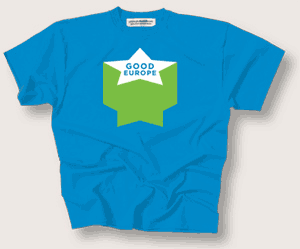 Philosophy Football’s Good Europe campaign T-shirt is available from here
Philosophy Football’s Good Europe campaign T-shirt is available from here
23.06.16 Fixture Clash Euro 2016 Football vs Euro Referendum 2016
22.02.16
When Euro 2016 clashes with the European Referendum this summer Mark Perryman ofPhilosophy Football reckons he knows what the final score will be
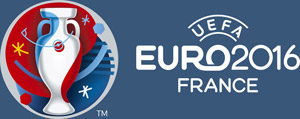 David Cameron, you know the one who gets his Villa’s and West Hams all in a muddle when professing his undying love for a team in claret n blue, obviously wasn’t checking the summer fixture lists when plumping for a date to have a Euro Referendum.
David Cameron, you know the one who gets his Villa’s and West Hams all in a muddle when professing his undying love for a team in claret n blue, obviously wasn’t checking the summer fixture lists when plumping for a date to have a Euro Referendum.
Not content to pee off the Scots and Welsh with a vote a few weeks after their 5 May elections, and Londoners too who vote for a Mayor on the same day Dave has also chosen to clash with football’s European Championships. And not only this summer time round will much of England be transfixed on the tournament but with Wales and Northern Ireland qualified three ‘home’ nations will be there together at a Euro or World Cup for the first time since World Cup ’82, more than thirty years ago. In anybody’s book this is an historic achievement likely to spur huge popular interest, woe betide any canvassers, from either side, who interrupt those with eyes, ears and emotions transfixed on the TV for the games. The TV schedules for debates will have to be arranged not to coincide with games. Big rallies on any night our teams are playing will have row after row of empty seats .
Just as the argument, in or out, reaches the proverbial fever-pitch a decent chunk of the English, Welsh and Northern Irish population (with the Republic qualified too both communities over there) will be maxing out their interest in all things European. And the Scots? Cheering on anyone but England, naturally!
This could be a fascinating mix. Those papers trumpeting get out of Europe on the front pages breathlessly reporting on results from being in Europe on the pitch splashed across the back pages.
Such a football vs politics fixture clash has some form beyond canvassers having doors slammed in their faces because they’ve interrupted a household watching a match on the TV.. In ’66, Wilson won a Labour landslide just ahead of England winning the World Cup and promptly draped his early version of Labour modernisation, the white-hot-technological variety, in all things football and Beatles More than a generation before Blairism’s Cool Britannia Harold’s ‘Have you ever noticed England only ever win the World Cup under a Labour Government’ is surely the definitive football-politics soundbite.
Four years later Wilson decided not to call a General Election until after the Mexico ’70 World Cup fully expecting an England team many considered to be better than the ’66 squad to retain the trophy. They didn’t, losing 3-2 to West Germany in the quarters. A team that was past it’s glory days, a country looking for something different after six years of Labour. Edward Heath, a yachtsman not not a football fan, led the Tories to victory.
In 1988 Jim Sillars scored a sensational by-election win for the SNP but lost his seat at the following 1992 General Election. This was in the midst of an era when Scotland qualified for Euros and World Cups including Italia ’90 and Sweden ’92. The Tartan Army were everywhere but no SNP breakthrough as a result. An angry Sillars derided the supporters as ‘ ninety-minute nationalists’. Now we have the obverse, no Scots team has qualified for a tournament since World Cup ‘98 , the SNP’s support never greater. Ninety-minute nationalism? The commitment is so all-consuming it seems like the Scots barely have time for the football.
In ’96 England hosted the European Championships. When England made it through to the semis (look away now if the score and manner of the exit is too painful to watch) there are well-substantiated rumours John Major considered calling a snap General Election if England should win the tournament and kill off new Labour before it was too late. A semi-final defeat to Germany, on penalties put paid to that idea.
Not to be outdone Blair wrapped his 1996 Labour Conference in the opportuity he believed Euro ’96 had carved out for new Labour:
“Labour’s coming home! (Applause) Seventeen years of hurt never stopped us dreaming. Labour’s coming home! (Applause) As we did in 1945 and 1964, I know that was then, but it could be again – Labour’s coming home. (Applause) Labour’s coming home.”
Cringeworthy doesn’t even begin to do those words justice. Still, it didn’t seem to do Blair very much harm and the rest is history.
And so history sends us rather mixed messages about Euro football vs Euro Referendum fixture clash. The most likely outcome will depend on which campaign has the best popular vision to project the meaning of Europe. So far the signs are dismal from both camps, in fact the entire commentariat, not to mention Cameron himself, appear to have entirely missed the clash of dates, and these people call themselves well-informed, in touch?
My vision of Europe is rooted in popular culture not the Westminster bubble politics of which self-serving Tory is stabbing another self-serving Tory in the back. National teams competing against one another, an expanded competition to recognise the new Europe, the free travel and mixing of fans and fan cultures, at home with our own ways of supporting our team, excited to take these on our travels away too. And UEFA, or FIFA? Not much love lost between us and them, institutions in dire need of reform but we’re not walking away from the need to change them either. Europe as a place we can call home when we want to, abroad when we don’t.
And the final score? If England, Wales and Northern Ireland combine to disappoint I wouldn’t count on support for staying in Europe doing very well as a result. But as I expect England to top their group, Wales come second, Northern Ireland stage an upset or two, France 2016 could prove to be one big party of being part of Europe not apart from. Never mind the establishment campaigns, instead then expect a populist wave of Euro-enthusiasm to sweep Yes to victory.
Mark Perryman is the co-founder of the self-styled ‘sporting outfitters of intellectual distinction’ aka Philosophy Football. His new book on the 50th anniversary of England winning the World Cup, 1966 And Not All That will be published in May by Repeater Books
Football's Unholy Trinity
16.02.16
After the recent ticket price protests Mark Perryman of Philosophy Football makes the case for rebuilding the fabled ‘people’s game’ from below
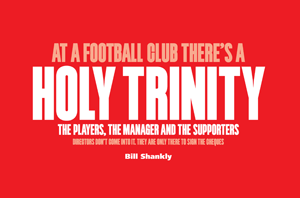 My favourite ever quote about politics is from Marx, "All that is solid melts into air, all that is holy is profaned.” Spookily for a professed agnostic I find the word ‘holy’ also features in another favurite quote, this time from another 'red', Bill Shankly, that made a reappearance during the Liverpool fan ticket price protests. “At a football club, there's a holy trinity - the players, the manager and the supporters. Directors don't come into it. They are only there to sign the cheques." Apply Marx’s dictum to modern football, Liverpool, virtually any other Premier League club and a decent chunk of the Championship and below too, the scale of the profanity is off the satanic scale. As for Shankly’s trinity not much of it's holiness remains either.
My favourite ever quote about politics is from Marx, "All that is solid melts into air, all that is holy is profaned.” Spookily for a professed agnostic I find the word ‘holy’ also features in another favurite quote, this time from another 'red', Bill Shankly, that made a reappearance during the Liverpool fan ticket price protests. “At a football club, there's a holy trinity - the players, the manager and the supporters. Directors don't come into it. They are only there to sign the cheques." Apply Marx’s dictum to modern football, Liverpool, virtually any other Premier League club and a decent chunk of the Championship and below too, the scale of the profanity is off the satanic scale. As for Shankly’s trinity not much of it's holiness remains either.
Recently the Premier League made a big deal of their rebranding. Call me old skool if you like but I date the start of the profanity to when the First Division became the ‘Premiership’, complete with super Saturdays and Sundays. Swiftly followed by the farce of a Division Two becoming ‘The Championship’ and the ludicrous renaming of Divisions Three and Four as Leagues One and Two. When marketing tramples on language to this scale something is seriously amiss. Language is power, it’s rewriting for the most spurious of ends will only end in something rotten.
So you’ll forgive me if I didn’t celebrate the Liverpool fans’ ‘victory’ over the £77 top price tickets in Anfield’s new stand with quite the gusto of some. This is nothing to do with club rivalry, well done to those Liverpool fans. But for all the their agitation the result is simply the preservation of the status quo - an over-priced game. The only substantial difference achieved was a favourable public relations gloss for the owners replacing the hitherto unfavourable one. Just a moment or two on a calculator reveals the scale of the hoodwinking going on. 1,000 tickets free to local school kids over the course of a season amounts to some 0.2% of all tickets that will be sold. 10,000 tickets at £9 total 2%, another 20,000 tickets at reduced prices for 17-21 year olds another 4%. It’s a tiny minority of those sold at higher prices, one that becomes even smaller when Cup and European games are factored in. A sop. Meanwhile those fans who walked out on the totemic 77th minute were barely a quarter of those at Anfield.
As fans there’s a collective indulgence in a different version of the misuse of language. ‘We had a decent result against XYZ Utd.’ There is no trinity anymore of the kind Shankly was describing, and thus no such ‘we’. The fans represent a community of interest of course. But players move on at will, managers too, taking their entire backroom staff with them, club strips change every season complete with shirt masker and sponsor dwarfing the club badge, which, ignoring any sense of history, frequently changes too. Historic grounds move, changing their name as well with the sale of stadium naming rights. Owners buy and sell clubs at will to the highest bidder. So who’s this ‘we’?
The ‘we’ is the constance of our support, meanwhile as Marx predicted everything else solid melts away. No, fans are not customers, nor are we consumers in the traditional sense. But that has hardly served our interests any better as a result. We won’t switch our loyalty and support to the other lot down the road because their tickets are cheaper, the sightlines in their stadium better, they play a more attractive or successful type of football. So ‘our’ club can do almost anything they want and nothing very much changes. For all the huff and puff on 5 Live’s 6.06 radio phone-in, there is no meaningful debate to effect any change to a steadily worsening situation. At the same time the leverage fans might have is steadily reduced as the percentage of our club’s income from the tickets they sell us gets smaller and smaller.
Despite all this there are plenty of instances that continue to make me proud of our football and provide me with a pride to call myself a fan. But they exist almost entirely outside the mainstream game. Just a few examples from the past few weeks that barely got a mention alongside all the media coverage of those Liverpool fan protests. Dulwich Hamlet anounce the hosting of a friendly match vs FC Assyria to raise funds for refugee charities. Football Unites Racism Divides in Sheffield are organising a festival to celebrate the women’s game. The ongoing militant anti-homophobia of the Clapton and Whitehawk Ultras. The growth of fan internationalism via the Glasgow, Yorkshire, London and other St Pauli Supporter Groups. The contunuing growth of the community ownership model of my club Lewes FC and plenty of others in non-league including, most famously FC United. The wildly ambitious efforts of Hackney Wick FC to create a club from scratch rooted in community action. The work around diversity of the much-maligned FA, most recently their Disability Talent ID day organised by County FA’s across England. The latest Kick it Out Raise your Game event to extend the diversity of football’s workforce. The superlative practical contribution via coaching and mentoring of Football Beyond Borders.
This is football from beyond Shankly’s now broken holy trinity. It goes on mainly unheralded enjoying a relative autonomy from the business culture that dominates the modern game. None of it would exist without the broader platform football provides yet not much of it is shaped by what the mainstream game has become either. Hence the ‘relative autonomy’ of my lexicon of Marxist analysis. It is a relationship shaped by class relations. In Shankly’s era his holy trinity was founded on an essentially common experience – fans, players and managers - framed by a working-class game. The money men, the local business elites of the butcher, baker and candlestick makers always had the ambition to divorce football from its origins. But the localism of football culture set limits to the scale of the disconnect they could effect. This is in essence what those Liverpool fans were seeking to defend. Not a ‘people’s club’ as such but at least a local club. It is the replacement of local business elites as owners by the global business elites of speculators, oligarchs and sheikhs that has massively accelerated the process of disconnection, it’s what turbo-capitalism does.
These various efforts outside the mainstream of football project an entirely different vision of what football might become. They are rooted in the values of the ‘people’s game’ yet are sensitive to the changes in class relations as much as patterns of ownership. Hence the centrality of issues of race, gender, sexuality and disability. There is a popular internationalism characterised by an affinity with the inter-cultural influence of resistant fan cultures wherever and whenever. And above all punk do-it-yourself ambition, if the owners of our clubs are going to make such a spectacular mess of running our clubs why not just run them ourselves.
There is of course a danger in over-stating the achievement of this other football. It remains a minority movement. But this is how almost all radical change has started. Initiatives that exist at the margins of the mainstream. Power relations after all seek to marginalise women, black, lesbian and gay, refugee, disabled and working-class communities for a reason. Key to these various responses are their challenge to this marginalisation as part of remaining loyal to Shankly’s ‘holy trinity’. In this sense they are as much about reinvention as reclamation. Football from below. It’s an idea whose time has come.
Mark Perryman is the co-founder of the self-styled ‘sporting outfitters of intellectual distinction, aka Philosophy Football. His new book 1966 and Not All That is published in late April by Repeater Books.
Hope vs Fear is match Another Europe campaign launch looks forward to
11.02.16
Sanjiv Sachdev reports for Philosophy Football on the practical idealism a new campaign is offering ahead of the Euro Referendum

A chilly February evening, in a packed hall, with a glitterball ceiling more accustomed to beery gigs and dancing, saw the launch of Another Europe is Possible with a broad range of speakers proffering support for a different kind of European Union. The launch was devoid of the dry, technocratic jargon and stale, cold language of narrow self interest, that so disfigures and stifles debate about the EU. Instead, it proposed a people centred Europe, a Europe based on hope rather than fear; a European Union with social and environmental justice at its heart. It proffered a confident, outward looking Europe rather than an inward looking Britain – one that recognised that working with others was likely to be more effective than doing things on our own.
There was a strong recognition that the EU is seriously flawed with deep democratic deficiencies and a myopic, destructive economics that has inflicted much misery but nevertheless in a globalised world it offered the potential for tackling climate change, strengthening worker rights, fighting corporate tax evasion and dealing with the refugee crisis – summed up in the campaign’s slogan‘stay in Europe to change Europe’. Many speakers expressed a sense that Brexit would entail a further shift to the right, that narrow nationalism would erode the protections and rights that have been won in the EU, and that, for all its flaws, leaving the EU would make matters worse. Some also noted that there may be a very short timetable - little more than four months (June 23rd) - before the referendum is held.
The range of speakers was wide - Asad Rehman, from Friends of the Earth, Marina Prentoulis from Syriza UK, three MPs Caroline Lucas (Green Party), Stephen Gethins (SNP), Hywel Williams (Plaid Cymru), Syrian refugee and PhD student Mohammed Ateek, striking Junior Doctor, Janna Bowen, Labour Party activist and writer Michael Chessum, from the NUS Sahaya James and Save Lambeth Libraries campaigner Ruth Cashman.
A series of alternatives was evident in the contributions from many of the speakers; a Fortress Europe against an Open Europe, a neo-liberal Europe versus a social Europe, a business centred or a people centred Europe, the solidarity of peoples or the divisions of nationalities, an unaccountable Europe or a democratic Europe, the freedom of movement versus the freedom of capital.
The stand out speaker was the Green Party MP (and former MEP) Caroline Lucas. She made clear the desperate, dismal, dreary paucity of Cameron’s deregulatory vision of Europe, that he was the most ardent advocate of the Transatlantic Trade and Investment Partnership (TTIP), but that leaving the EU would not lead to a more benign trade policy. The fact that the stronger regulation of bankers was an issue that particularly provoked his ire was telling. In the Paris climate talks, Caroline noted that the EU had raised the environmental standards of countries like Poland. She argued for a Europe in which every EU country had a minimum wage; that the idea of a basic income should be explored in every EU country and that a new economic model be pursued – one that recognises that the planet has finite resources. Moreover, she criticised the ‘Stronger In’ campaign for not having values based arguments, but for instead pursuing a narrow, instrumentalist approach. Finally, she felt that we should not neglect the ‘peace dividend’ of the EU - that before the EU the continent had been riven with conflict and that now, be it ever so cumbersome, differences were dealt with by discussion and debate – a far better option.
The biggest welcome of the evening though was for striking Junior Doctor Janna Bowen. She noted that a fifth of all new doctors are from the EU – of her seven colleagues, five came from the EU. EU workers are vital to the NHS. She also noted the positive impact of the Working Time Regulations – which brought in protections to stop tired doctors making mistakes - and the greater pool of scientific resources when EU countries work together.
Many other issues were issues by the panel and the audience. These included the implications of the leftward shift in Portugal, Spain and Greece; the curious bedfellows emerging in this debate – such as Plaid Cymru finding itself in the same voting lobby as the Ulster Unionists; the dilemma posed if England votes to exit and Wales and Scotland vote to remain; that the mainstream ‘In’ campaign looks like the establishment and is run by establishment; the EU’s positive role in introducing regulations tackling the sewage on our beaches and the air pollution that blights so many cities and damages so many lives. One audience member, a young Polish migrant worker raised the virtues of the freedom of movement and how concerns over issues of security of employment had spread from British trade unions to the Polish diaspora. Speakers contended that we would still shaped by laws that we could no longer influence’; the dangers of post-EU ‘race to the bottom’ economics were noted, further weakening worker protections and diluting environmental safeguards.
The event concluded with some final thoughts from the panel. For all the virtues of Facebook and Twitter – in many ways, they preach to the converted - the importance of looking outwards and talking to people was a lesson from both the current doctor’s dispute and the Scottish referendum, in essence, the revitalisation of grassroots campaigning. Constructing a coalition of disparate voices but around some common aims seemed to characterise the event – one that humanised an ‘In’ campaign, where the abstract can lead to apathy. A campaign based on hope rather than fear is always the more appealing prospect.
Note Philosophy Football’s Campaign T-Shirt Another Europe Is Possible is just £9.99 and available from here.
Yanis Varoufakis launches Democracy in Europe Movement DiEM25
10.02.2016
Phil Butland reports from Berlin forPhilosophy Football
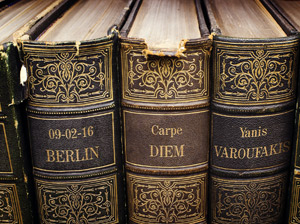 Former Greek finance minister Yanis Varoufakis launched his Democracy in Europe Movement (DiEM25) on 9th February at the Volksbühne theatre in the centre of Angela Merkel’s Berlin. Promising a message of hope to “people who don’t believe in politics”, he spoke of a broad transnational movement aimed at democratising Europe before it disintegrates. “If we do nothing”, he said “we’ll return to the 1930s”.
Former Greek finance minister Yanis Varoufakis launched his Democracy in Europe Movement (DiEM25) on 9th February at the Volksbühne theatre in the centre of Angela Merkel’s Berlin. Promising a message of hope to “people who don’t believe in politics”, he spoke of a broad transnational movement aimed at democratising Europe before it disintegrates. “If we do nothing”, he said “we’ll return to the 1930s”.
Accompanying Varoufakis on the podium were political leaders and intellectuals from the broad left, including German LINKE leader Katja Kipping and Podemos MEP Miguel Crespo Urban to Croatian philosopher Srecko Horvat and British artist-musician-activist Brian Eno. Joining by video link were the mayor of Barcelona Ada Colau, US economist James K Galbraith, Wikileaks founder Julian Assange and Slovenian intellectual Slavoj Zizek.
Varoufakis stressed his belief in a genuinely broad movement: “I am proudly Left but DiEM25 is more than that. Neoliberalism has made social democracy impossible. I ask all democrats, social democrats, liberal democrats: can you live with this`? We are radical in a way that liberal democrats must be if they are to survive.”
Place was also allowed for dissenters from Varoufakis’s project. Veteran German SPD MP Gesine Schwan was introduced as the only member of the German government who had offered any support to Varoufakis when he was in office. Schwan said: “I won’t be part of the movement, but I don’t want to calm the enthusiasm”. She agreed that the financial crisis was the start of destroying democracy in Europe, and offered to cooperate on future projects.
DiEM25 has launched an initial manifesto on www.diem25.org with four main principles:
· No European people can be free as long as another’s democracy is violated.
· No European people can live in dignity as long as another is denied it.
· No European people can hope for prosperity if another is pushed into permanent insolvency and depression.
· No European people can grow without basic goods for its weakest citizens, human development, ecological balance and a determination to become fossil-fuel free in a world that changes its ways – not the planet’s climate
The Website also calls on “our fellow Europeans to join us forthwith to create the European movement which we call DiEM25”. It is, at the moment, still somewhat vague about what this movement is to do. This was noted in the brief round of questions at the end of the launch. A number of speakers from the floor asked “where do we come in?” and “how do we get from A to B?”
Democracy Deficit
From the wide range of different speeches in the Volksbühne, there appears to be consensus on two main things – the need to address the current deficit of democracy in Europe, and the need to reform the EU.
Regarding democracy, Varoufakis compared the European Union to the Soviet Union, where initial hopes of liberation were replaced by a faceless bureaucracy. According to Srecko Horvat “the dream of the marriage between capitalism and democracy is over. We saw that last year with SYRIZA”.
Horvat argued that when we try to understand how we have reached the limits of this democracy deficit, we should not just blame the failures of SYRIZA. The European left as a whole also failed to build effective solidarity. A single election victory in one country was never going to be sufficient – even the occupation of every square in Europe would not be enough. What is needed is a common transnational movement that challenges power in every country.
At the moment, DiEM25 seems to be prioritising the struggle for democracy over more radical campaigns against neo-liberalism. Varoufakis says that he has friends and close collaborators who could be called Thatcherites or neo-liberals, and that even they would sign up to his appeal for more democracy. This may work for the short term, but some time down the line, DiEM25 must confront the question as to whether neo-liberalism is the cause or the effect of the democracy deficit.
Criticism of the current EU
All speakers criticised the current EU, with British Green Party MP Caroline Lucas making the point that the discussion about the EU carried out by DiEM25 was quite different to the debate in Britain. The British debate is generally polarised between David Cameron’s vision of a Europe based on division not solidarity versus the little Englanderism of UKIP. As a former MEP who served 10 years in Brussels, Lucas said that she had no illusions in the EU, but that the solution is reform.
Varoufakis noted the “pivotal year” of 2015, when the EU “quite substantially” failed with an economic policy that condemned large parts of Europe’s periphery to permanent poverty. After the Greek government was forced to capitulate, it had to spend massive amounts of money bailing out banks. In contrast, European governments are squabbling about a fraction of this amount being used to help refugees.
Podemos MEP Miguel Crespo Urban called for an end to the corporate power in Europe and Brussels, saying that EU secret agreements like TTIP show that the EU is in the control of corporate power. Cynical EU institutions are building higher walls against refugees while using debt as a weapon to blackmail the people of the South. Events last year in Greece showed how banks, not tanks, can be used to stage a coup d’état.
Ada Colau expressed her shame that refugees are suffering from the effects of a Brussels coup d’état in Greece. She called for a fight for a democratic Europe based on the support of people from the bottom up. She said that Europe can be Europe again if it’s put in the hands of its people. On that basis we should be prepared for a long fight.
Other speakers seemed to have greater illusions that the EU can be quickly reformed. According to former Portuguese MEP Rui Tavares, only the change of 2 or 3 laws would have the EU working democratically. Yet if the other speakers are correct it is difficult to see how the current power imbalance can be overturned so easily
Tavares noted that at the moment half of the centre-left is sitting in neo-liberal governments, while the other half is “helping the far right to leave Europe”. This idea that saying that the EU is irreformable plays into the hands of the racists was reiterated by several speakers, including Slavoj Zizek who warned against “the return to strong nation states”.
Yet the demand that we choose between EU reform and strong states is anargument which is predicated on the idea that the EU ever operated in the interest of its citizens rather than European big business. As Julian Assange put it “After World War Two there was a dream for what Europe could be, and this dream has been lost”. There remains the question as to whether this dream was ever realised in the EU.
One of the biggest problems confronting DiEM25 will be developing an analysis of exactly how its central aim of reforming the EU can be won, and what a reformed EU would look like.
Movement, not a party
Varoufakis stressed his belief that “the model of national parties is obsolete. DiEM25 should have no hierarchies, we are horizontal.” This is a laudable aim. It is though somewhat unclear how this will work in practice.
Every effective movement requires people who take organisational responsibility. Often the attempt to avoid hierarchies has led de facto power being in the hands of a few individuals – a charge often made against Pablo Iglesias’ Podemos.
Associated with the issue of movements and parties is the one of what DiEM25 should actually do. Independent Irish MEP Nessa Childers raised the question of whether we need power and, if so, what kind of power? She asked if DiEM25 should stand candidates in future elections, acknowledging that although these questions do not need to be answered immediately, DiEM25 must address them if it is to have a permanent future.
Similarly it is unclear how the movement will remain broad and radical. The presence on the podium of many Greens was a sign of the proposed diversity. Yet where the Greens have entered office in Europe their record has been generally quite rotten. This was acknowledged by Cecile Duflot, president of the French Greens and a former minister in Francois Hollande’s neo-liberal red-green government.
Duflot eventually left this government, but other Greens throughout Europe remain in office at national or local level. Gesine Schwan also noted her disappointment that Germany’s Social Democratic Party is in a coalition government with Merkel, and is supporting and implementing austerity politics. When DiEM25 comes into conflict with these governments, will its centre be able to hold?
Getting from A to B
DiEM25 has drawn up a timetable of immediately demanding full transparency in EU decision making, and using existing institutions and EU treaties to address the ongoing economic crisis within the next twelve months. It demands that a European Constitutional Assembly be set up within 2 years, whose decisions should be enacted by 2025 (hence the name DiEM25).
The first demands of the movement are live streaming of all EU meetings and the publishing of all their minutes. In the medium term, DiEM25 will organise a series of discussions to develop policy proposals to stabilise debt.
Alongside these general demands, DiEM25 members will also be involved in specific campaigns. Caroline Lucas made a list of demands including a European Green New Deal, energy efficiency, a minimum wage in each country, a European basic income, and a challenge to the idea that all problems are solved by economic growth.
Gerardo Pisarello, the deputy mayor of Barcelona spoke of the real gains that have already been made by the left-wing municipal governments in Spanish “rebel cities”. Although these governments only took office 8 months ago, they have already won moderate victories by uniting with movements for refugees and against evictions. Pisarello called for better cooperation of rebel cities throughout Europe.
Podemos MEP Miguel Crespo Urban also emphasised the importance of grassroots movements. He recently visited an initiative welcoming refugees in Moabit, a working-class area of Berlin. He said that despite media reports, it was such initiatives which were really helping refugees, not the Merkel government. He went on “we are coming from the social movements, from the people in the streets and the squares. We can never forget that.”
A number of other speakers also mentioned refugees and the responsibility of Western warmongering for the refugee “crisis”. At a press conference in the morning, Varoufakis explained “when someone knocks on our door in the middle of the night and they’re wet and hungry you don’t do a cost-benefit analysis.” Caroline Lucas made it clear that the resources are there to provide help: “never ever believe them when they say there’ no money for what we want them to do. They can always find money for wars and nuclear weapons”
Anna Siedle from the German anti-capitalist “Blockupy” movement talked of planned mobilisations in Berlin in the Autumn and international demonstrations before next year’s German national elections protesting against Germany’s domination of Europe. Hans-Jürgen Urban, Executive member of the IG Metall union, also emphasised the special responsibility of the German left and trade unions in fighting Merkel’s austerity government.
What now?
Varoufakis seems to be convinced that the simple demand of live streaming EU meetings and publishing minutes could be enough to break down the whole façade. He was supported here by Zizek, who said “demand something relatively modest, no-one can be opposed to it. But if you take this demand to the end everything falls apart. We just need the iron will to follow this demand to the end.”
Backing up these demands, DiEM25 has a timetable for the next 1-2 years. Varoufakis promises policy initiatives every 2 months, backed up by town hall meetings and meetings in theatres like the Volksbühne, leading to much bigger events. Quoting Dylan Thomas, he said: “DiEM25 is about not going gently in the good night. To rage, rage against the dying of the light”
It is still unclear whether this simple message will gain the necessary momentum, or how DiEM25 will cooperate with existing initiatives, such as the Plan B proposed by leading left figures in Europe around Oskar Lafontaine. Of course this does not mean that the attempt is not worth it. Srecko Horvat quoted Samuel Beckett saying “try again. Fail again. Fail better”. According to Horvat, our greatest enemy is not failure but passivity.
Addressing the idea that not all of DiEM25’s demands are fully-formed, Brian Eno said that this is a necessary component of making a step into the unknown: “We have strong feelings and need to make a bold step forwards. Start cooking – recipe to follow.” The full demands of what we want can only be developed in the process of the struggle.
One thing is sure – DiEM25 is not lacking in ambition. Varoufakis concluded his speech by warning that “the real danger is not aiming too high and missing but training our eyes on the floor. Tonight we’ll celebrate but tomorrow morning let’s shake Europe”.
NOTE : Philosophy Football’s Another Europe is Possible campaign T-shirt is now available just £9.99 from here
- And then there were two
01.03.25 - This Land is (still) Your Land
22.02.25 - Happy 80th Birthday Bob Marley
01.02.25
